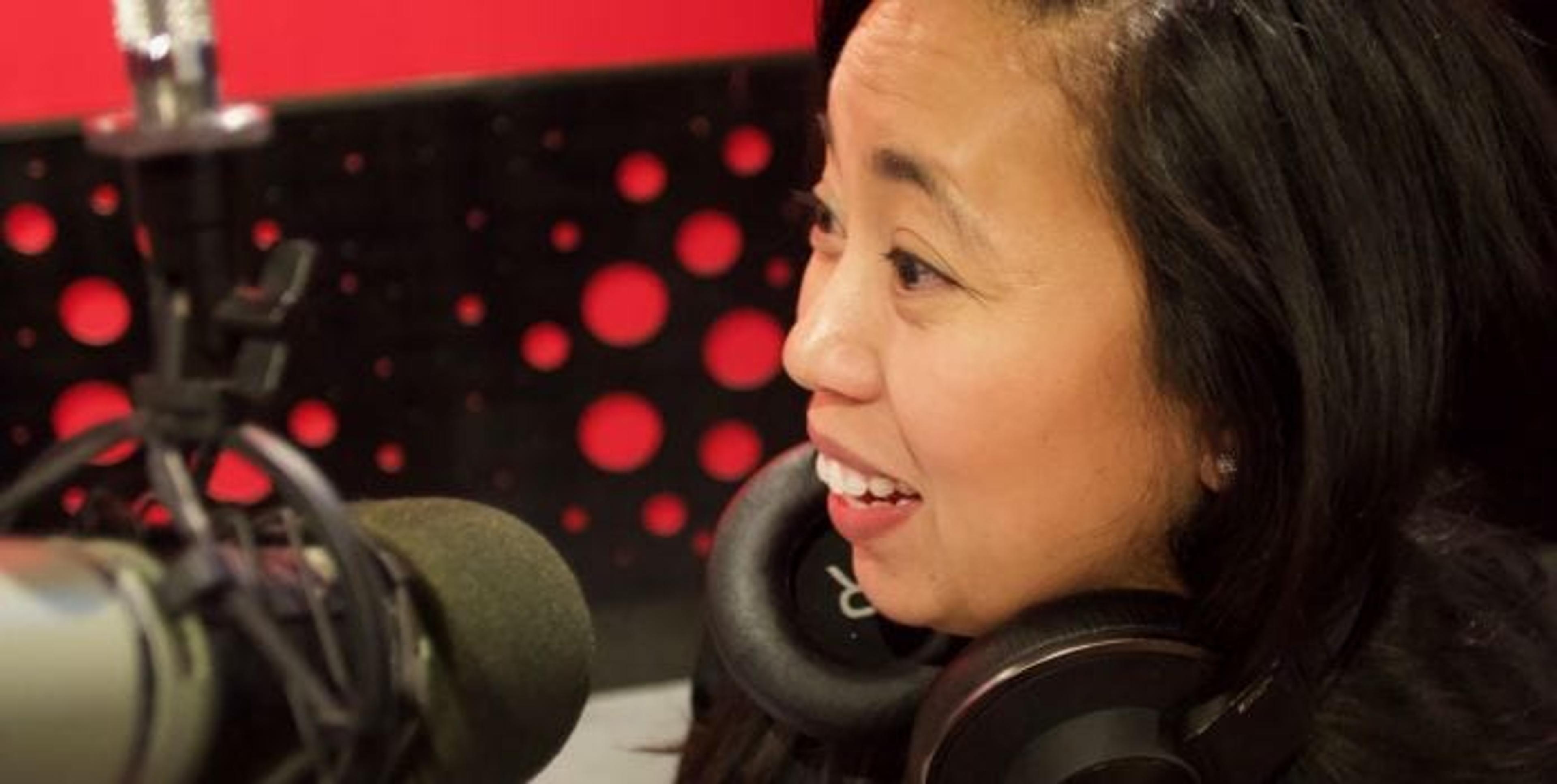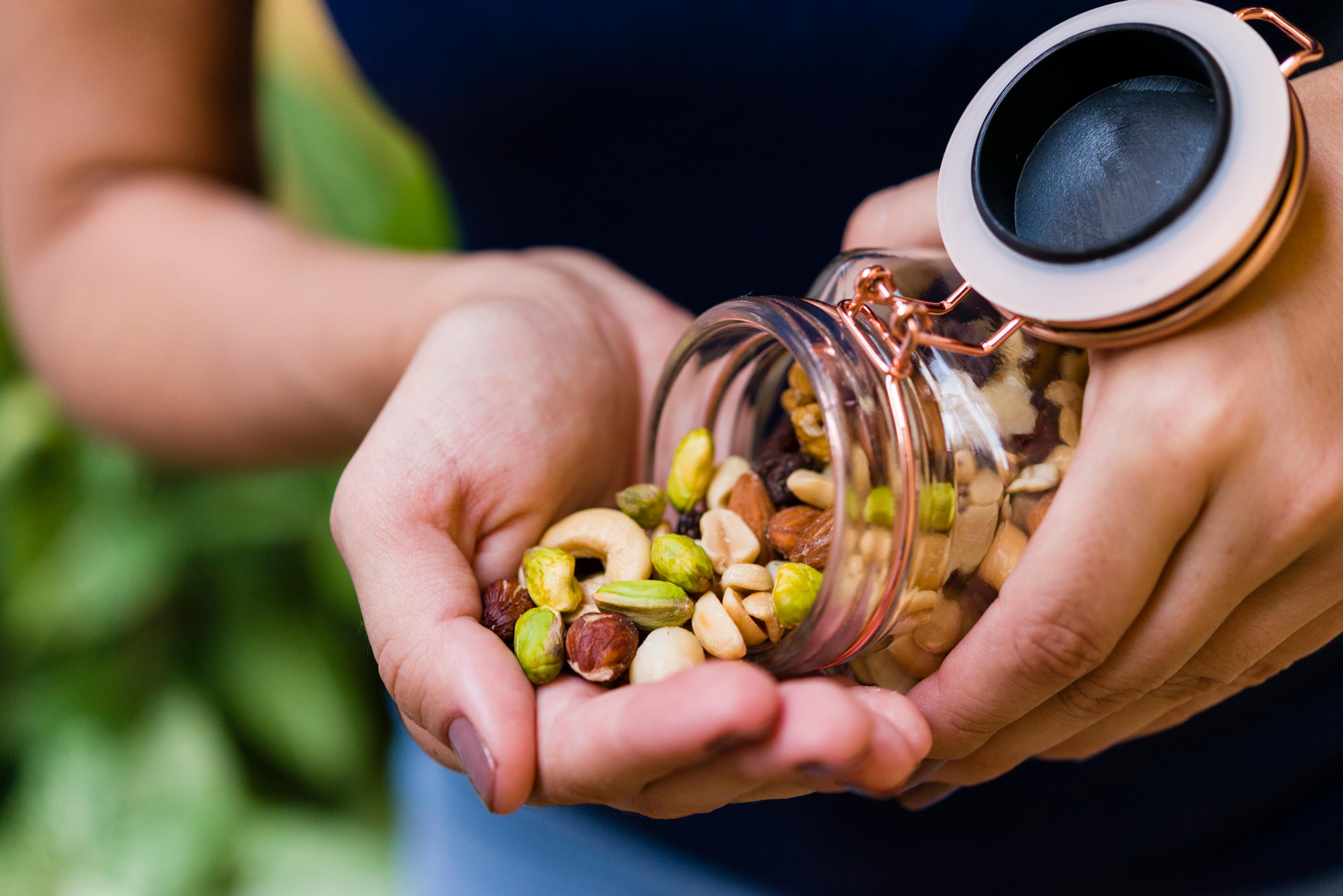Healthy Fats that are Good for the Heart
| 1 min read

00:00
00:00
About the Show
On this episode, Chuck Gaidica is joined by registered dietitian and certified diabetes educator, Grace Derocha to discuss the benefits of fat.
“Any fat, and ideally heart healthy fat…helps our bodies absorb fat-soluble vitamins which are the A, D, E and K that we definitely need… We know this in Michigan, and a lot of places that don’t have a lot of sun. We need that vitamin D and we need to absorb it efficiently any way we can.” – Grace Derocha
In this episode of A Healthier Michigan Podcast, we explore:
- The different types of fat
- Heart healthy fats and their sources
- Fat and nutrient absorption
- Breaking down omega-3, omega-6, and omega-9
- The differences between coconut oil and olive oil
- How fat impacts cholesterol
Transcript
Chuck: This is A Healthier Michigan Podcast, episode 22. Coming up we discuss healthy fats that are good for your heart.
Chuck: Yes, there is such a thing. Welcome to A Healthier Michigan Podcast, the podcast dedicated to navigating how we can improve our health and well-being through small healthy habits we can start implementing right now. I’m your host Chuck Gaidica. Every other week we’re gonna sit down with a certified health expert from Blue Cross Blue Shield of Michigan and we’re going to do a deep dive in the topics covering nutrition, fitness, a lot more.
Chuck: In this episode we’re talking about fat. Don’t look at me when you say that. We’re gonna talk about good fats and all kinds of numbers, omega-3, omega-6, omega-9, I don’t know, I need a calculator. But we’ve got somebody who’s gonna help us, Grace Derocha is back. She’s a registered dietitian, certified diabetes educator and certified health coach with Blue Cross Blue Shield of Michigan. Good to see you my friend.
Grace: Good to see you.
Chuck: Yeah. Nice to be back in our new season with you. Happy New Year.
Grace: Yes, I’m excited, thanks.
Chuck: So I should tell everybody a little bit more about you. You love people, you love food, you love life. She’s a wife, a mom of two, she enjoys dancing, very passionate about helping the world become healthier. And you’ve said this to me off mic, you feel like you have this normal approach to it. I mean, we all have to get along in life but we can still know some of these good habits, right?
Grace: Yes, absolutely. And I think that is something that I think is so important that we can do this, we can do better and still be normal. Still enjoy the party, still enjoy February and Valentine’s Day, and all of those fun things that might be coming up.
Chuck: And you know people may not know but they may hear you across the state because it seems like you must have a private jet. I mean, you’re a star of radio, TV, you have film yet? Are the Golden Globes in your future for next year?
Grace: Chuck, I love you and I’m so embarrassed right now.
Chuck: Why?
Grace: Because.
Chuck: No, you’re everywhere. You’re in Grand Rapids, you’re in Lansing, you’re on the podcast. It’s just great. It’s great to see you.
Grace: I feel like it is truly my honor and pleasure to hopefully spread the good word of good health.
Chuck: Well, let’s do it. Let’s take that olive oil or whatever we’re gonna do and you’re gonna teach us about this. So let’s talk first of all about some of the basics which we think we know but you can help us navigate. Good fat and bad fat, what are they?
Grace: Yes. So it’s really interesting. This is an important topic when it comes to heart health and choosing heart healthy fats. We know now that we need some fat. There’s fat soluble vitamins that we need to have fat to help us absorb those vitamins, A, D, E and K, those are the ones. But we also know that fat got a bad rap for a while. Everyone was on a low-fat diet back in the day because they thought fat was evil, but we know that there are heart healthy fats that we do need to keep our heart ticking nice and strong.
Chuck: And you know then there are the people who on the opposite end of the spectrum are doing the high-fat thing.
Grace: Right.
Chuck: I mean, they’re eating bacon and coconut oil in their coffee. I mean, so it can go either way.
Grace: Right.
Chuck: Is it moderation is there this place in the middle truly that we should all be?
Grace: Yes. I love the word moderation but I have a love-hate relationship with that word.
Chuck: Why?
Grace: Because moderation, in moderation, right?
Chuck: Yeah.
Grace: I think it can get us into trouble. There’s actually a physician, Dr. Michael Geiger who talks about this a little bit, about moderation and how sometimes we ride that wave of moderation and then we’re just doing what everyone else is doing instead of really focusing on what’s good for us.
Chuck: Interesting.
Grace: And what we should be doing.
Chuck: Yeah, so you’re not really in tune with your body, you’re just reading some article and then you just do it for the next 10 years, yeah.
Grace: Right. And it’s funny because he was looking at research about heart health. He was talking about this grandma and how she was in a terrible state and then made changes to her diet and used food as medicine for herself and ended up living to be 95 years old. And back in the day when they were talking about smoking there was all this talk about moderation in smoking is fine using that word and then we learned obviously that is not the case. So, sometimes I like to use the word moderation other times I wanna say be careful of it.
Chuck: I’m gonna raise my hand and ask if it’s okay next time, okay? You just point to me. So talk about unsaturated fats. So there’s poly and mono-
Grace: Yes.
Chuck: … unsaturated fats?
Grace: Yes. So, our unsaturated fats are our heart healthier fats. There is monounsaturated fat and what’s interesting that’s your omega-9 fatty acids, but we actually make those in our body as well. But you also can get them from food. So, those are a good place to start when you’re thinking about, “What kind of fat should I be having regularly?”
Chuck: What are the sources? Where do I get them if my body is not doing its thing?
Grace: Yes. So some of our omega-9s would be things like nuts. So a variety, almonds, walnuts, pistachios, pecans, but what’s interesting is as I name some of these foods there actually is a little bit of polyunsaturated fats in them as well.
Chuck: And we wanna be careful about salt, right? Because you’re not saying we get that giant 55 gallon drum at Costco?
Grace: No.
Chuck: And just reach in at Super Bowl Parties and holidays and just eat all the nuts because that’s not moderation, sorry.
Grace: Yes. Right. Exactly. I think what’s interesting too is you can definitely … if you’re picking options of different kinds of nuts, you can pick the unsalted ones and then control some of that yourself or add different spices to your nuts to enjoy different flavors without necessarily adding sodium for the people that need to watch their sodium intake.
Chuck: So what else do we get omega-9 from? There are other sources, right?
Grace: So, yes. There is olives, there are safflower oil, sunflower oil. So, a lot of our nuts and seeds the oils that they come from or the nuts and seeds butters. So almond butter, peanut butter, sunflower seed butter.
Chuck: And what’s the relationship or are we there yet for the omega-9s and like the vitamins you were mentioning. Vitamin A, or D, or whatever?
Grace: Yeah. So, any fat and ideally heart healthy fat the fat helps our bodies absorb efficiently fat-soluble vitamins which are the A, D, E and K that we definitely need. And if we know this in Michigan and a lot of places that don’t have a lot of sun we need that vitamin D and we need to absorb it efficiently any way we can. So making sure we have the fat to go with…
Chuck: Well, you’re talking about something that’s critically important and here we are at this time of the year. I mean, the clouds come into Michigan about November and they don’t leave until-
Grace: April.
Chuck: … April Fools’ Day, right?
Grace: Yeah.
Chuck: And so that vitamin D thing, I remember a few years back I got a chance to interview Dr. Oz and I said, “What’s the biggest advice you can give to us in Michigan?” He said, “I don’t care if it’s the middle of winter, roll up your sleeves, roll up your pant legs and go sit at a park bench for 10 minutes in the cold. Just get some sun on you to create vitamin D because,” he looked at me and said, “You people in Michigan you need sun.”
Grace: Yes. Absolutely. I could not agree more. Many people in Michigan I’m not sure of the exact number we’re vitamin D deficient.
Chuck: We are?
Grace: Yes.
Chuck: Oh my gosh. All right. So are we done with the monounsaturated fats?
Grace: Yes, so that’s-
Chuck: What about poly?
Grace: So polyunsaturated fats and these are buzz words that I’m sure people hear. Those are omega-3 fatty acids and omega-6 fatty acids. And those are the ones that our body does not create. So we have to get those from dietary food and need some people will use supplements as well.
Chuck: And we should seek them out is what you’re saying?
Grace: Yes.
Chuck: We need them and we need to get them from other sources?
Grace: Yes, I definitely want people getting their well all their heart healthy fats in but especially the omega-3s. So this is gonna sound confusing for a second.
Chuck: Okay, go ahead.
Grace: We do net get enough omega-3s and we get too much omega-6. Both of them are considered heart healthier fats but we still want that ratio to be in good standing to avoid extra inflammation in the body.
Chuck: Well, who would have thought that? Who would have thought that some kind of fat will help with inflammation and that’s an increasing problem all across America, right?
Grace: Yes. Yes. It affects people getting different chronic conditions.
Chuck: Their joints.
Grace: Yes. Everything from arthritis to things like other diseases like dementia or Alzheimer or Parkinson’s.
Chuck: So, what are the sources? What are we going to seek out for omega-3 and omega-6?
Grace: The main and one of the best sources of omega-3s and if you guys don’t hear anything else today I will say this many times, two to three times a week we should be getting some heart healthy fish in.
Chuck: So the wilder the fish the better, in other words?
Grace: Yes.
Chuck: It can be farm raised because when you go to a restaurant you’ve got one choice of salmon, right?
Grace: Right. Right. And most restaurants are trying to do better but, yes, salmon is definitely one of those top choices, herring, sardines, mackerel, trout, what am I missing? Anchovies.
Chuck: My wife thinks I’m kooky because I love herring, it’s a family tradition New Years that when I was growing up, in sour cream so I have to tell you straight up. But you’re only having one or two pieces and sardines. I’ve had sardines-
Grace: I love sardines.
Chuck: … I do too but it’s an old-school thing. But it’s handy-dandy if you’re looking for something to throw into a lunch bag and go.
Grace: Yeah, so easy. And it’s nice because at different stores now I see the sardines in cans and there’s spicy, there’s different flavors.
Chuck: There are the bigger ones too not the little guys, the thicker bigger and I feel it’s more manly, like maybe I caught it.
Grace: Exactly. Well and another good thing about sardines is it gives you lots of calcium.
Chuck: Oh good.
Grace: And some people are lacking in that as well. So we’re piggybacking off a lot of good things with our heart healthy fish.
Chuck: Okay.
Grace: Avocados are also great.
Chuck: For both 3 and 6, omega-3 and 6?
Grace: More 3, little bit less 6. So I’m trying to think what else. Walnuts.
Chuck: Okay. So still on that nuts and seeds, fish, avocados. I mean, that’s a lot of that we’ve heard but I’m not sure I’ve heard that really two to three times a week for fish is the mandate because you always get these stories, don’t eat popcorn, don’t do this.
Grace: I know.
Chuck: And there were these times where they said you can have too much fish because of what’s going on in the oceans all over the world and frankly I’ve not paid that much attention to it because for me two to three times a week for a solid piece of fish is still a … it’s a stretch. I’ll just tell you. You’ve got to plan for that.
Grace: Yes, meal planning we talked about that before that when it comes into play. I would say the one category of person that should be careful with too much fish because of mercury is if you’re a woman who’s pregnant.
Chuck: Okay, yeah.
Grace: Just making sure that you are careful of the sources and not overdoing it.
Chuck: Okay. Well, we’re in the Great Lakes too. So sometimes we have choices of sole and other things and all right so let’s talk about saturated fats.
Grace: Oh, I forgot Omega-6s.
Chuck: What? Oh omega-6, okay.
Grace: So this is the one that especially in America we’re getting too much of and our ratio is off. I’m gonna tell you guys the ideal ratio of 3 to 6 is four to one. That’s where we should be and we are flipping it the other way and doing upwards of 50 to one more omega-6.
Chuck: So what are we doing wrong that we’re getting so much omega-6?
Grace: Well, omega-6 is in a few places and it’s not bad, it’s just too much. We use it a lot for cooking or processed cooking whether it be baked goods or when people dine out. Things like grapeseed oil, flax seed but I would say more of the dining out and having processed baked goods or processed foods that are using omega-6 is where we get into trouble.
Chuck: Where does olive oil fall?
Grace: Olive oil has 3 and 6. Little bit of 9, actually two. So I like olive oil, it’s great, you wanna make sure it’s from a good source. The one other thing I would say with olive oil is that it’s better for something you’re sautéing and not baking because the smoke point.
Chuck: Yes, yeah.
Grace: You’ve heard that.
Chuck: I’ve noticed that even when I’m cooking, not so much baking. I don’t know that I’ve thrown it into something to bake. What I have noticed is that when you think you’re having a healthy oil and I’ve just watched, we’ve got five kids which is like 20 Canadians. So I’m watching all the kids and sometimes I see a little too much and I’m guilty of this too. You think it’s healthy so you’re putting a lot in a place to fry a little something up. I’m not sure that you’re not defeating the whole purpose, right?
Grace: I’m actually really glad that you bought up that point because in general we’re saying for good heart health and to actually keep your weight in a good range as well for good health around, 30% of your calories should come from fats. And with some of these diets that we see out here like you mentioned, like keto diet that is a very, very, I mean, that’s basically all fat, little bit of protein and almost zero carbs. But what happens I think when people go on any diet and we’ve talked about this is that it has an end. You can’t live on bacon alone. I know we think we can.
Chuck: I know. I know. I talked to a lady once who told me her husband was a cyclist. I don’t know if I mentioned this in a previous episode, maybe. That he was on a diet of butter, beer and bacon. And I thought, “How I that sustainable?” For a minute it actually sounds interesting but now I’m thinking, “What?”
Grace: There’s been stories about people going on a diet and following certain calorie restriction and only eating McDonald’s like for a month and they lose weight, but then what did you actually do to your body? So, I would say, yes, that’s such a great point. Even though it’s a heart healthy fat, avocado oil, avocados even. I don’t know if I told you this, I had a girlfriend she was doing Peace Corps work in Africa. And in her backyard she had an avocado tree. And there wasn’t really much as far as eating available to her.
Grace: So she was making an avocado tomato salad every day. Three times a day she’s having a whole entire avocado. She sends me a Facebook message and she’s like, “I’ve gained 20 pounds, I don’t know what I’m doing,” she’s like, “I’m still working out, there’s barely any food here. I don’t even know why this is happening.” And I’m like, “Well, tell me what are you eating?” She was like, “Well, I have an avocado tree,” and I knew. I knew right then because she’s a picky eater and I know she loves avocados. I’m like, “How many are you having?”
Grace: And she’s like, “Three.” And I was like, “Three?” She’s like, “Three a day.” I was like, “No.” Maureen if you’re listening. Yeah, so we snipped that in the bud. Because even though it was a heart healthy fat source and she was getting all those omega-3s in she was having too much fat and that was making her weight go up, which also can be detrimental to your heart.
Chuck: Sure. Sure. All right. So, are we good with omega-3 and omega-6 and omega-9?
Grace: Yes, so many things.
Chuck: Okay. So let’s talk about what? Saturated hydrogenated fats because we got a few points to get to here.
Grace: Yeah. So, hydrogenated fats are bad. Trans fats are bad. Hydrogenated oils are chemically processed animal oils that then adding more fat into it to make it more solid and shelf stable.
Chuck: So some chemical process and some machine is whipping it onto something … we think it resembles butter but it’s not really butter?
Grace: Exactly.
Chuck: Yeah, okay.
Grace: We don’t like those. And I think most people know what now. No trans-fat, stay away from hydrogenated oils. Saturated fats I think this one’s the confusing one, coconut oil. I have stories about coconut oil.
Chuck: I know some people have taken it by the table spoonful. The bullet coffee idea, right?
Grace: Right the bullet coffee idea. I would say it’s a great moisturizer and it’s really good for your hair. But just be careful. The nice things about coconut oil it’s usually organic or coming from a clean place in that sense but it is a palm oil it is hard and solid at room temperature so it is a saturated fat. And for a while what happened is there was a study that a woman did on medium chain trans fatty acids that comes in a MCT. And what happened is she was doing a study about weight management and using MCT oil but she was using 100% full grade only MCT. Coconut oil happens to have the most MCT in it naturally.
Chuck: People seek it out.
Grace: But it’s only at 13 to 15 percent that’s where that research got lost in translation. 100% MCT oil is expensive and really hard to get.
Chuck: And you can raise your bad cholesterol by having some of the bad fats, right?
Grace: Yes.
Chuck: Can’t that’s be a problem?
Grace: Right, exactly. And I’m also glad that you … speaking of because at the end of the day, right? We’re looking at our heart health, we’re looking at our numbers, we want our cholesterol at a good place but there … it can be really confusing the HDL is a good cholesterol, the LDL is known as the bad cholesterol but what’s interesting is LDL and HDL are actually protein that help carry cholesterol in the body.
Grace: So, these number get skewed in people’s heads and they think that HDL and LDL are actually cholesterol but they’re actually protein-carrying cholesterol throughout the body and that’s why we want that HDL happy cholesterol to help that blood move and that cholesterol keep moving so it’s slippery.
Chuck: I’m shooting for all that because I know it’s only season two. I’m shooting for season 40 with you. I wanna be healthy.
Grace: You’re in for the long haul.
Chuck: Well, I’m gonna try my best. So, as we wrap up here you’ve talked about avocados, anything else about oils, any other source that we should be looking to that you haven’t mentioned?
Grace: I’d say fish.
Chuck: Fish, two to three times a week.
Grace: Yes.
Chuck: Yeah.
Grace: I know earlier we were talking and I said a day, that was a joke. Two to three times a week. We wanna make sure that you guys are getting your fish. And I will say people ask me about supplements, “Should I take fish-”
Chuck: Like vitamin D. I pop vitamin D sometimes in the winter.
Grace: Yes.
Chuck: That’s okay?
Grace: Yeah. Make sure … and what I would say is have it with a meal that has heart healthy fat-
Chuck: Interesting.
Grace: … so that your body absorbs it more efficiently.
Chuck: Okay. See I’ve just been taking it but okay, I can do that.
Grace: And then fish oil too. If you’re looking for a good fish oil you wanna try to make sure it has DHA and ALA like different kinds of fish oil, oil in that fish.
Chuck: This is all good stuff. It got a little slippery there for a minute with all the oils, but I mean, it really is. It’s good stuff because you can really see how you can influence your diet with very basic ideas. And even some small tweaks, right?
Grace: And don’t forget those fruits and vegetables. One of the diets, I put that in air quotes, that we know that can help the heart is one that has a lot of plants-based power in it. We know that for a fact. That is one of the only diets that we know is proven to help increase your life.
Chuck: I’m leaning, I’m not a vegan or a vegetarian I’m leaning veggie, right? I mean, I do that and I’m doing more black beans and stuff so.
Grace: Well, when I say plant-based I don’t mean it has to all be because we want our fish. But I want people to … We’re in America, we’re not getting enough.
Chuck: My wife does not think I should be eating the herring, for some reason it freaks her out. Would you write me a prescription? You’ve got all the credentials. I just know you do. Just write me something. Grace it’s good to see you.
Grace: Thank you so much Chuck.
Chuck: Oh, you’re very welcome. Listen, we want you to keep listening to this podcast because we have got all kinds of great things coming your way. This is A Healthier Michigan Podcast, it’s brought to you by Blue Cross Blue Shield of Michigan. If you like the show, you wanna know more you can actually get a great newsletter. Go to ahealthiermichigan.org/podcast. You can leave reviews there. You can leave ratings on iTunes, Stitcher, even Spotify now.
Chuck: And of course that newsletter gives you a whole lot more content, new episodes coming every other week. You can get them on your smartphone, tablet. Go for a walk, go for a drive and bring Grace Derocha in the car with me and you. I’m Chuck Gaidica, have a great rest of your day.





